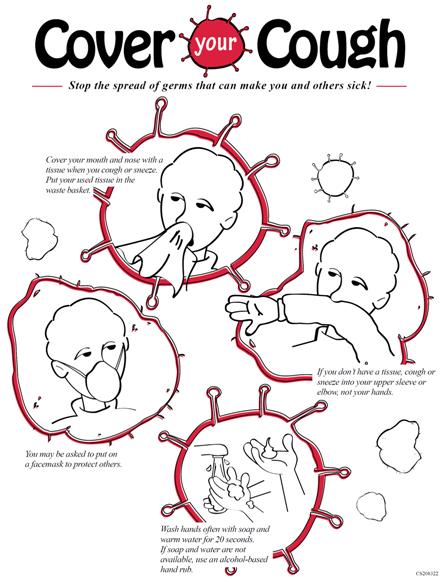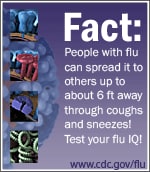It’s not possible to predict what this flu season will be like. Flu seasons are unpredictable in a number of ways. While flu spreads every year, the timing, severity, and length of the season usually varies from one season to another. People are exposed to cold and flu germs every day, here are a few suggestions to help you stay healthy when everyone around you is sick. Coronavirus Disease 2019 (COVID-19)
Staying Healthy
-
- Get a flu shot. The Center for Disease Control (CDC) recommends a yearly flu vaccine for everyone 6 months of age and older as the first and most important step in protecting against this serious disease. While there are many different flu viruses, the seasonal flu vaccine is designed to protect against the main flu viruses that research suggests will cause the most illness during the upcoming flu season. People should begin getting vaccinated soon after flu vaccine becomes available, ideally by October, to ensure that as many people as possible are protected before flu season begins.
- Try to avoid close contact with sick people.
- If you are sick with flu-like illness stay home for at least 24 hours after your fever is gone, except to get medical care or other necessities.
- While sick, limit your contact with others as much as possible.

- Wash your hands. Wash your hands often with soap and water. If soap and water are not available, use an alcohol-based hand rub.
- Sneeze and cough into a tissue, throw the tissue away, and then wash your hands. If you don;t have a tissue sneeze into your elbow rather than your hand.
- Avoid touching your eyes, nose and mouth. Germs spread this way.
- Clean shared items such as phones, keyboards, handles and door knobs with alcohol wipes or other sanitizer type wipes.
- Drink plenty of fluids, do not share drinking cups or straws.
- Get lots of fresh air.
- Eat healthy and exercise regularly.
- Relax – Stress can decrease immunity.
Cover Your Cough

Influenza (flu) and other serious respiratory illnesses are spread by cough, sneezing, or unclean hands.
To help stop the spread of germs,
- Cover you mouth and nose with a tissue when you cough or sneeze.
- put your used tissue in the waste basket.
- If you don’t have a tissue, cough or sneeze into your upper sleeve or elbow, not yours hands.
- Wash your hands often with soap and warm water for 20 seconds.
- If soap and water are not available, use an alcohol-based hand rub.
Already Sick?
The flu is different from a cold. The flu usually comes on suddenly. People who have the flu oten feel some or all of these symptoms:
-
- Fever* or feeling feverish/chills
- Cough
- Sore throat
- Runny or stuffy nose
- Muscle or body aches
- Headaches
- Fatigue (tiredness)
- Some people may have vomiting and diarrhea, though this is more common in children than adults.
* It’s important to note that not everyone with flu will have a fever.
Usually, colds and flu simply have to be allowed to run their course. You can try to relieve symptoms without taking medicine. Gargling with salt water may relieve a sore throat and cool-mist humidifier may help relieve stuffy noses.
Other steps to consider:
- Call your doctor. This will ensure that the best course of treatment can be started early.
- If you are sick, try not to make other sick too. Limit your exposure to other people. Also cover your mouth with a tissue when you cough or sneeze, and through tissues into trash immediately.
- Stay hydrated and rested. Fluids can help loosen mucus and make you feel better, especially if you have a fever. Avoid alcohol and caffeinated products, these may dehydrate you.
- Know your medicine options. If you choose to use medicine, there are over-the-counter (OTC) options that can help relieve the symptoms of colds and flu. Talk to your health care professional to find out what will work best for you.
Taking OTC Products
- Be wary of unproven treatments. It s best to use treatments that have been approved by the FDA and be sure to tell your health care professional about any supplements or herbal remedies you use.
- Read medicine labels carefully and follow the directions. People with certain health conditions, such as high blood pressure, should check with a health care professional or pharmacist before taking a new cough or cold medicine.
- Choose appropriate OTC medicines Choose OTC medicines specifically for your symptoms. If all you have is a runny nose, only use medicine that treats a runny nose.
- Decongestants – May help relieve a running nose.
- Cough Suppressants – May help quiet coughs.
- Expectorants – May loosen mucus so you can cough it up.
- Antihistamines – May help stop a running nose and sneezing
- Pain Relievers – May help ease fever, headaches, and minor aches.
- Check medicine’s side effects. Certain medications, such as antihistamines can cause drowsiness. Medications can interact with food, alcohol, dietary supplements, and each other. The safest strategy is to check with our health care professional or pharmacist.
- Check with a doctor before giving medicine to children. Get medical advice before treating children suffering from cold or flu. Do not give children medication that is labeled only for adults.
When to see a doctor…
See a health care professional if you aren’t getting any better or if your symptoms worsen. With children, be alert for high fevers and for abnormal behavior such as unusual drowsiness, refusal to eat, crying a lot, holding the ears or stomach, and wheezing.
Other Resources
Flu Guide for Parents (PDF) – Centers for Disease Control & Prevention
*Sources: Centers for Disease Control Prevention (CDC) and US Federal Food & Drug (FDA)*

